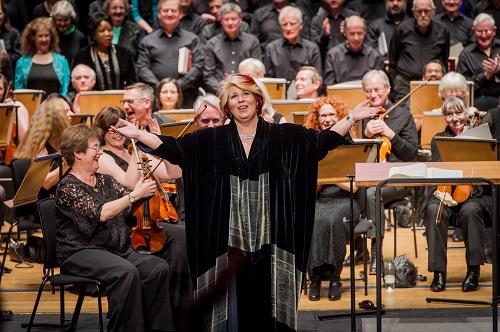 United Kingdom Verdi, Il Trovatore: Soloists, Chorus and Orchestra of Chelsea Opera Group, Deborah Miles-Johnson (chorus master), Andrew Greenwood (conductor), Cadogan Hall, London, 28.2.2016. (RP)
United Kingdom Verdi, Il Trovatore: Soloists, Chorus and Orchestra of Chelsea Opera Group, Deborah Miles-Johnson (chorus master), Andrew Greenwood (conductor), Cadogan Hall, London, 28.2.2016. (RP)

Cast:
Leonora: Sally Silver
Azucena: Marianne Cornetti
Manrico: Jonathan Stoughton
Conte di Luna: Roland Wood
Ferrando: Jihoon Kim
Ines: Natasha Jouhl
The Chelsea Opera Group’s concert performance of Verdi’s Il Trovatore in London’s Cadogan Hall, a fine early-20th-century pile in the Byzantine Revival style with superb acoustics, was a high octane affair. If a certain subtly was missing, the visceral rewards more than compensated for that. Andrew Greenwood, who has been chorus master and conductor of the Welsh National Opera, music director of the English Touring Opera, and artistic director of the Buxton Festival, was the source of that energy. He knows how to shape phrases and indeed whole scenes, maintaining the tension throughout to achieve the maximum impact. That is not to say he is insensitive to dynamics and mood, but under the circumstances he wisely played to the strengths of his cast, chorus, and orchestra.
The raison d’être for the performance was the Azucena of Marianne Cornetti, and she did not disappoint. She has sung the role in opera houses around the world, and the COG’s Il Trovatore was London’s first opportunity to experience it. The voice is a miracle of power and flexibility from top to bottom. It is the emotion which she imparts into her singing, however, that makes her Azucena so memorable. Whether she is reeling in horror at the flames which consumed her mother, or crazed at the thought that she had tossed her own child into the flames, longing for the peace and quiet of the mountains, or reveling in vengeance achieved, Cornetti imbues each with an emotional force all its own. She is also a physical singer ̶ swirling as if lost in a trance as she sings her tragic tales or jostling with (here imaginary) soldiers as they take her into custody. The cheers and applause that rained down upon her at the end were well deserved.
Roland Wood is the rare singer who barely needs to lift his little finger to create a character. He does it all with his voice and face, especially the glare in his eyes. His is not a particularly plush voice, but the top is clarion-like, and it has the edge to cut through Verdi’s orchestra. Di Luna’s great aria, “Il balen del suo sorriso,” was one of the vocal high points of the evening. One can envision a more multi-faceted count, but in a concert performance without costumes or sets, Wood’s minimalist approach was very effective.
Adding to the dramatic fireworks was Sally Silver’s Leonora. Vocally, the role’s dramatic passages were more congenial terrain for her than the high-flying, lyrical ones. She sculpted beautiful phrases, and her dynamic shadings were lovely, but her voice did not bloom in Leonora’s soft, spinning phrases. She also erred on the side of restraint in her stage deportment but, as with Wood, this worked for her. By the fourth act, you really did believe that she was Leonora, willing to sacrifice herself to save the man that she loved. And given her Manrico, that is high praise indeed. It is not easy singing passionate love duets to a bewildered tenor whose nose is buried in the score much of the time.
Inexplicably, Jonathan Stoughton appeared not to have received the memo instructing him to show up knowing his part and dressing just a bit sharp. With his handsome looks and flowing dark hair, he might have thought that he was channeling Errol Flynn, but he appeared more disheveled than dashing in a black shirt that was loosely tucked into trousers of the same color, sans belt. Stoughton gave the same slapdash impression vocally and musically: he left almost none dramatically. It is a singular breed of tenor that needs the score for “Di quella pira,” and an even rarer one who looks down at it, rather than at the audience, during the aria’s final, climactic high notes, but he belongs to it. He has a decent instrument, as evidenced by his mellifluous off-stage singing, but that was hardly enough to cut it with this cast.
At the other end of the spectrum was Jihoon Kim as Ferrando, resplendent in white tie and tails and rock-solid vocally. His telling of the chilling saga (“Abbietta zingara”) of a witch burned at the stake and a child’s skeleton found afterwards in the ashes was gripping. Coming as it does at the beginning of the opera, it set the mood for the high drama to follow. Natasha Jouhl, a COG regular, made the most of the brief role of Ines, Leonora’s friend and confident, singing with rich, firm tone, and appropriately fretful over the fate of her mistress.
The air was electric in the final moments of the opera. Cornetti and Wood were at opposite sides of the stage and they commanded it. The count’s moment of triumph was cut off by Azucena hurling the words at him that he had just ordered the murder of his own brother. It was if a thunderbolt had struck him. His look of horror and Azucena’s triumphant cry of revenge reverberated throughout the hall. Give them wands, and they could have been wizards fighting to the death in a Harry Potter film. What an ending!
Rick Perdian
